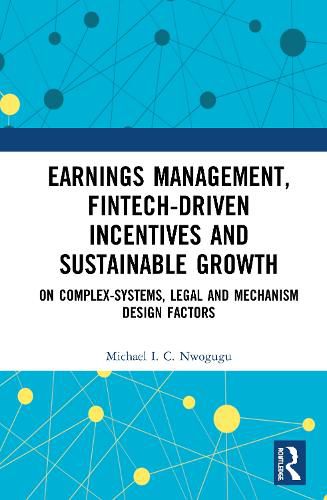Readings Newsletter
Become a Readings Member to make your shopping experience even easier.
Sign in or sign up for free!
You’re not far away from qualifying for FREE standard shipping within Australia
You’ve qualified for FREE standard shipping within Australia
The cart is loading…






Earnings Management in all its forms is a major macro-economic ‘leakage’ that distorts fiscal, monetary, and social policy. The Global financial Crises and the failures of many international conglomerates have partly been caused by earnings management and have had rippling effects on many regional and national economies. Many companies, government agencies and non-profit organizations own substantial amounts of commercial real estate and intangibles and are vulnerable to earnings management issues that lead to fraud, inaccurate financial reporting and inconsistent credit analysis. In Earnings Management, Incentives and Intangibles, Mike Nwogugu not only defines earnings management as a form of misconduct, but he also identifies the major psychological, legal and social aspects of the phenomenon, and introduces methods to eliminate or substantially reduce earnings management. In the process, he provides an analysis of the organizational impact of the psychological and behavioural issues involved. Here, the author explains why Incentives are also Intangibles in Institutional Economics; and explains how the incentives granted to employees, and the incentives inherent in firms’ transactions and organizational structures can either facilitate or hinder Earnings Management. The book focuses on Intangible Assets and real estate because historically, more than fifty per cent of all earnings management around the world is associated with these two types of assets; which coincidentally, are also some of the most vulnerable to external factors beyond management’s control. With its international scope, this volume provides valuable insights for Board members and senior/mid-level executives of companies that own substantial real estate portfolios, or intangibles and goodwill, which need to ensure that their analyses of profitability and financial stability are sound. It also serves the needs of those in the accounting; legal; and regulatory fields, specifically thos
$9.00 standard shipping within Australia
FREE standard shipping within Australia for orders over $100.00
Express & International shipping calculated at checkout
Earnings Management in all its forms is a major macro-economic ‘leakage’ that distorts fiscal, monetary, and social policy. The Global financial Crises and the failures of many international conglomerates have partly been caused by earnings management and have had rippling effects on many regional and national economies. Many companies, government agencies and non-profit organizations own substantial amounts of commercial real estate and intangibles and are vulnerable to earnings management issues that lead to fraud, inaccurate financial reporting and inconsistent credit analysis. In Earnings Management, Incentives and Intangibles, Mike Nwogugu not only defines earnings management as a form of misconduct, but he also identifies the major psychological, legal and social aspects of the phenomenon, and introduces methods to eliminate or substantially reduce earnings management. In the process, he provides an analysis of the organizational impact of the psychological and behavioural issues involved. Here, the author explains why Incentives are also Intangibles in Institutional Economics; and explains how the incentives granted to employees, and the incentives inherent in firms’ transactions and organizational structures can either facilitate or hinder Earnings Management. The book focuses on Intangible Assets and real estate because historically, more than fifty per cent of all earnings management around the world is associated with these two types of assets; which coincidentally, are also some of the most vulnerable to external factors beyond management’s control. With its international scope, this volume provides valuable insights for Board members and senior/mid-level executives of companies that own substantial real estate portfolios, or intangibles and goodwill, which need to ensure that their analyses of profitability and financial stability are sound. It also serves the needs of those in the accounting; legal; and regulatory fields, specifically thos